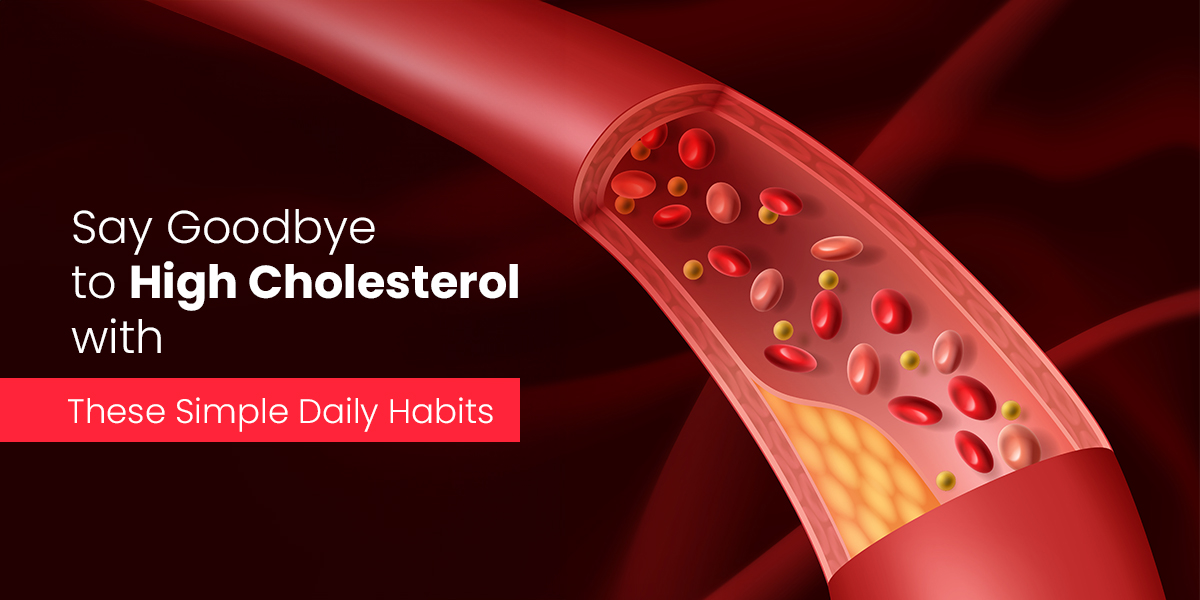Say Goodbye to High Cholesterol with These Simple Daily Habits

We all want a healthy lifestyle but are we leading one? An average human being eats 3 meals a day but have you ever noticed how much cholesterol your meal contains? In simple words, cholesterol is an essential fat requirement of our body to carry out daily activities. It is very important for better heart health. Let’s take an example of our atmosphere. Among the various gases present in our daily environment, some can be beneficial while others may be harmful to our system. Similarly, when we talk about cholesterol, there is a good one as well as bad one.
Good cholesterol, also known as High-Density Lipoprotein (HDL), moves fat molecules out of artery walls, decreases the buildup of immune cells, and helps prevent or even reverse artery disease.
On the other hand, bad cholesterol, also known as Low-Density Lipoprotein (LDL) as it builds up in your blood vessels, increases the risk of health issues like heart attacks or strokes.
High cholesterol is a serious health concern that can increase your risk of heart disease and stroke. In this blog, we will be discussing some ways to lower the level of LDL.
1. Embrace a Heart-Healthy Diet:
Cut back on saturated fats: Saturated fats are found in foods like ghee, butter, and full-fat dairy products, which can raise your overall LDL cholesterol. Choose lean protein sources such as fish, chicken, and legumes.
Eliminate trans fats: These unhealthy fats, often found in processed foods, increase bad LDL cholesterol. Check food labels for “partially hydrogenated vegetable oil” and avoid these products.
Incorporate omega-3 fatty acids: Foods like salmon, mackerel, herring, walnuts, and flaxseeds are rich in omega-3s, which provide heart-protective benefits like lowering blood pressure.
Increase soluble fiber: Foods such as oatmeal, lentils, chickpeas, apples, and pears are high in soluble fiber, which helps reduce LDL cholesterol by preventing its absorption into the bloodstream.
Consider whey protein: Studies suggest that whey protein, found in dairy products, can also lower bad LDL cholesterol and blood pressure.
2. Get Moving:
Regular exercise is crucial for maintaining healthy cholesterol levels. Aim for at least 30 minutes of moderate-intensity exercise most days of the week, or 20 minutes of vigorous activity three times a week. Brisk walking, cycling, or playing your favorite sport are all excellent options.
3. Consumption of cigarettes:
Smoking tobacco raises the risk of heart disease by increasing LDL and decreasing HDL, promoting cholesterol buildup in arteries, and impairing cholesterol transportation and absorption. Quitting smoking can help reverse these harmful effects; your circulation and lung function will start to improve, and your risk of heart disease will be cut in half.
4. Monitor your weight:
Even a small amount of excess weight can contribute to cholesterol. Shedding extra pounds can make a big difference. Make small, permanent changes to your diet and exercise routine. Swap out sugary drinks for water, choose healthy snacks like popcorn or airy pretzels, and find ways to incorporate more movement into your day.
5. Drink in moderation:
If you enjoy drinking, do so in moderation. For health reasons, limit yourself to one drink a day. Remember, excessive alcohol consumption can lead to serious health problems, including liver disease and an increased risk of certain cancers. Drinking too much can also negatively impact mental health and contribute to addiction.
These lifestyle changes can dramatically improve your cholesterol levels and reduce your risk of heart disease. Considering our atmosphere again, we need to breathe in oxygen but can’t avoid inhaling some harmful gases, although we can use various methods to release toxins. However, if we can’t keep a check on cholesterol, then choosing the alternatives mentioned above, can help reduce LDL levels, leading to better heart health and overall well-being.
Remember, it’s always best to talk to your doctor before making any major changes to your diet or exercise routine.

 Call-an-Ambulance
Call-an-Ambulance



